- Home
- Salman Rushdie
The Satanic Verses: A Novel Page 2
The Satanic Verses: A Novel Read online
Page 2
‘Fly,’ it commanded Gibreel. ‘Sing.’
Chamcha held on to Gibreel while the other began, slowly at first and then with increasing rapidity and force, to flap his arms. Harder and harder he flapped, and as he flapped a song burst out of him, and like the song of the spectre of Rekha Merchant it was sung in a language he did not know to a tune he had never heard. Gibreel never repudiated the miracle; unlike Chamcha, who tried to reason it out of existence, he never stopped saying that the gazal had been celestial, that without the song the flapping would have been for nothing, and without the flapping it was a sure thing that they would have hit the waves like rocks or what and simply burst into pieces on making contact with the taut drum of the sea. Whereas instead they began to slow down. The more emphatically Gibreel flapped and sang, sang and flapped, the more pronounced the deceleration, until finally the two of them were floating down to the Channel like scraps of paper in a breeze.
They were the only survivors of the wreck, the only ones who fell from Bostan and lived. They were found washed up on a beach. The more voluble of the two, the one in the purple shirt, swore in his wild ramblings that they had walked upon the water, that the waves had borne them gently in to shore; but the other, to whose head a soggy bowler hat clung as if by magic, denied this. ‘God, we were lucky,’ he said. ‘How lucky can you get?’
I know the truth, obviously. I watched the whole thing. As to omnipresence and -potence, I’m making no claims at present, but I can manage this much, I hope. Chamcha willed it and Farishta did what was willed.
Which was the miracle worker?
Of what type – angelic, satanic – was Farishta’s song?
Who am I?
Let’s put it this way: who has the best tunes?
These were the first words Gibreel Farishta said when he awoke on the snowbound English beach with the improbability of a starfish by his ear: ‘Born again, Spoono, you and me. Happy birthday, mister; happy birthday to you.’
Whereupon Saladin Chamcha coughed, spluttered, opened his eyes, and, as befitted a new-born babe, burst into foolish tears.
2
Reincarnation was always a big topic with Gibreel, for fifteen years the biggest star in the history of the Indian movies, even before he ‘miraculously’ defeated the Phantom Bug that everyone had begun to believe would terminate his contracts. So maybe someone should have been able to forecast, only nobody did, that when he was up and about again he would sotospeak succeed where the germs had failed and walk out of his old life forever within a week of his fortieth birthday, vanishing, poof!, like a trick, into thin air.
The first people to notice his absence were the four members of his film-studio wheelchair-team. Long before his illness he had formed the habit of being transported from set to set on the great D. W. Rama lot by this group of speedy, trusted athletes, because a man who makes up to eleven movies ‘sy-multaneous’ needs to conserve his energies. Guided by a complex coding system of slashes, circles and dots which Gibreel remembered from his childhood among the fabled lunch-runners of Bombay (of which more later), the chair-men zoomed him from role to role, delivering him as punctually and unerringly as once his father had delivered lunch. And after each take Gibreel would skip back into the chair and be navigated at high speed towards the next set, to be re-costumed, made up and handed his lines. ‘A career in the Bombay talkies,’ he told his loyal crew, ‘is more like a wheelchair race with one-two pit stops along the route.’
After the illness, the Ghostly Germ, the Mystery Malaise, the Bug, he had returned to work, easing himself in, only seven pictures at a time … and then, justlikethat, he wasn’t there. The wheelchair stood empty among the silenced sound-stages; his absence revealed the tawdry shamming of the sets. Wheel-chairmen, one to four, made excuses for the missing star when movie executives descended upon them in wrath; Ji, he must be sick, he has always been famous for his punctual, no, why to criticize, maharaj, great artists must from time to time be permitted their temperament, na, and for their protestations they became the first casualties of Farishta’s unexplained hey-presto, being fired, four three two one, ekdumjaldi, ejected from studio gates so that a wheelchair lay abandoned and gathering dust beneath the painted coco-palms around a sawdust beach.
Where was Gibreel? Movie producers, left in seven lurches, panicked expensively. See, there, at the Willingdon Club golf links – only nine holes nowadays, skyscrapers having sprouted out of the other nine like giant weeds, or, let’s say, like tombstones marking the sites where the torn corpse of the old city lay – there, right there, upper-echelon executives, missing the simplest putts; and, look above, tufts of anguished hair, torn from senior heads, wafting down from high-level windows. The agitation of the producers was easy to understand, because in those days of declining audiences and the creation of historical soap operas and contemporary crusading housewives by the television network, there was but a single name which, when set above a picture’s tide, could still offer a sure-fire, cent-per-cent guarantee of an Ultrahit, a Smashation, and the owner of said name had departed, up, down or sideways, but certainly and unarguably vamoosed …
All over the city, after telephones, motorcyclists, cops, frogmen and trawlers dragging the harbour for his body had laboured mightily but to no avail, epitaphs began to be spoken in memory of the darkened star. On one of Rama Studios’ seven impotent stages, Miss Pimple Billimoria, the latest chilli-and-spices bombshell – she’s no flibberti-gibberti mamzell, but a whir-stir-get-lost-sir bundla dynamite – clad in temple-dancer veiled undress and positioned beneath writhing cardboard representations of copulating Tantric figures from the Chandela period, – and perceiving that her major scene was not to be, her big break lay in pieces – offered up a spiteful farewell before an audience of sound recordists and electricians smoking their cynical beedis. Attended by a dumbly distressed ayah, all elbows, Pimple attempted scorn. ‘God, what a stroke of luck, for Pete’s sake,’ she cried. ‘I mean today it was the love scene, chhi chhi, I was just dying inside, thinking how to go near to that fatmouth with his breath of rotting cockroach dung.’ Bell-heavy anklets jingled as she stamped. ‘Damn good for him the movies don’t smell, or he wouldn’t get one job as a leper even.’ Here Pimple’s soliloquy climaxed in such a torrent of obscenities that the beedi-smokers sat up for the first time and commenced animatedly to compare Pimple’s vocabulary with that of the infamous bandit queen Phoolan Devi whose oaths could melt rifle barrels and turn journalists’ pencils to rubber in a trice.
Exit Pimple, weeping, censored, a scrap on a cutting-room floor. Rhinestones fell from her navel as she went, mirroring her tears … in the matter of Farishta’s halitosis she was not, however, altogether wrong; if anything, she had a little understated the case. Gibreel’s exhalations, those ochre clouds of sulphur and brimstone, had always given him – when taken together with his pronounced widow’s peak and crowblack hair – an air more saturnine than haloed, in spite of his archangelic name. It was said after he disappeared that he ought to have been easy to find, all it took was a halfway decent nose … and one week after he took off, an exit more tragic than Pimple Billimoria’s did much to intensify the devilish odour that was beginning to attach itself to that forsolong sweet-smelling name. You could say that he had stepped out of the screen into the world, and in life, unlike the cinema, people know it if you stink.
We are creatures of air, Our roots in dreams And clouds, reborn In flight. Goodbye. The enigmatic note discovered by the police in Gibreel Farishta’s penthouse, located on the top floor of the Everest Vilas skyscraper on Malabar Hill, the highest home in the highest building on the highest ground in the city, one of those double-vista apartments from which you could look this way across the evening necklace of Marine Drive or that way out to Scandal Point and the sea, permitted the newspaper headlines to prolong their cacophonies. FARISHTA DIVES UNDERGROUND, opined Blitz in somewhat macabre fashion, while Busybee in The Daily preferred GIBREEL FLIES COOP. Many photographs were publishe
d of that fabled residence in which French interior decorators bearing letters of commendation from Reza Pahlevi for the work they had done at Persepolis had spent a million dollars re-creating at this exalted altitude the effect of a Bedouin tent. Another illusion unmade by his absence; GIBREEL STRIKES CAMP, the headlines yelled, but had he gone up or down or sideways? No one knew. In that metropolis of tongues and whispers, not even the sharpest ears heard anything reliable. But Mrs Rekha Merchant, reading all the papers, listening to all the radio broadcasts, staying glued to the Doordarshan TV programmes, gleaned something from Farishta’s message, heard a note that eluded everyone else, and took her two daughters and one son for a walk on the roof of her high-rise home. Its name was Everest Vilas.
His neighbour; as a matter of fact, from the apartment directly beneath his own. His neighbour and his friend; why should I say any more? Of course the scandal-pointed malice-magazines of the city filled their columns with hint innuendo and nudge, but that’s no reason for sinking to their level. Why tarnish her reputation now?
Who was she? Rich, certainly, but then Everest Vilas was not exactly a tenement in Kurla, eh? Married, yessir, thirteen years, with a husband big in ball-bearings. Independent, her carpet and antique showrooms thriving at their prime Colaba sites. She called her carpets klims and kleens and the ancient artefacts were anti-queues. Yes, and she was beautiful, beautiful in the hard, glossy manner of those rarefied occupants of the city’s sky-homes, her bones skin posture all bearing witness to her long divorce from the impoverished, heavy, pullulating earth. Everyone agreed she had a strong personality, drank like a fish from Lalique crystal and hung her hat shameless on a Chola Natraj and knew what she wanted and how to get it, fast. The husband was a mouse with money and a good squash wrist. Rekha Merchant read Gibreel Farishta’s farewell note in the newspapers, wrote a letter of her own, gathered her children, summoned the elevator, and rose heavenward (one storey) to meet her chosen fate.
‘Many years ago,’ her letter read, ‘I married out of cowardice. Now, finally, I’m doing something brave.’ She left a newspaper on her bed with Gibreel’s message circled in red and heavily underscored – three harsh lines, one of them ripping the page in fury. So naturally the bitch-journals went to town and it was all LOVELY’S LOVELORN LEAP, and BROKEN-HEARTED BEAUTY TAKES LAST DIVE. But:
Perhaps she, too, had the rebirth bug, and Gibreel, not understanding the terrible power of metaphor, had recommended flight. To be born again, first you have to and she was a creature of the sky, she drank Lalique champagne, she lived on Everest, and one of her fellow-Olympians had flown; and if he could, then she, too, could be winged, and rooted in dreams.
She didn’t make it. The lala who was employed as gatekeeper of the Everest Vilas compound offered the world his blunt testimony. ‘I was walking, here here, in the compound only, when there came a thud, tharaap. I turned. It was the body of the oldest daughter. Her skull was completely crushed. I looked up and saw the boy falling, and after him the younger girl. What to say, they almost hit me where I stood. I put my hand on my mouth and came to them. The young girl was whining softly. Then I looked up a further time and the Begum was coming. Her sari was floating out like a big balloon and all her hair was loose. I took my eyes away from her because she was falling and it was not respectful to look up inside her clothes.’
Rekha and her children fell from Everest; no survivors. The whispers blamed Gibreel. Let’s leave it at that for the moment.
Oh: don’t forget: he saw her after she died. He saw her several times. It was a long time before people understood how sick the great man was. Gibreel, the star. Gibreel, who vanquished the Nameless Ailment. Gibreel, who feared sleep.
After he departed the ubiquitous images of his face began to rot. On the gigantic, luridly coloured hoardings from which he had watched over the populace, his lazy eyelids started flaking and crumbling, drooping further and further until his irises looked like two moons sliced by clouds, or by the soft knives of his long lashes. Finally the eyelids fell off, giving a wild, bulging look to his painted eyes. Outside the picture palaces of Bombay, mammoth cardboard effigies of Gibreel were seen to decay and list. Dangling limply on their sustaining scaffolds, they lost arms, withered, snapped at the neck. His portraits on the covers of movie magazines acquired the pallor of death, a nullity about the eye, a hollowness. At last his images simply faded off the printed page, so that the shiny covers of Celebrity and Society and Illustrated Weekly went blank at the bookstalls and their publishers fired the printers and blamed the quality of the ink. Even on the silver screen itself, high above his worshippers in the dark, that supposedly immortal physiognomy began to putrefy, blister and bleach; projectors jammed unaccountably every time he passed through the gate, his films ground to a halt, and the lamp-heat of the malfunctioning projectors burned his celluloid memory away: a star gone supernova, with the consuming fire spreading outwards, as was fitting, from his lips.
It was the death of God. Or something very like it; for had not that outsize face, suspended over its devotees in the artificial cinematic night, shone like that of some supernal Entity that had its being at least halfway between the mortal and the divine? More than halfway, many would have argued, for Gibreel had spent the greater part of his unique career incarnating, with absolute conviction, the countless deities of the subcontinent in the popular genre movies known as ‘theologicals’. It was part of the magic of his persona that he succeeded in crossing religious boundaries without giving offence. Blue-skinned as Krishna he danced, flute in hand, amongst the beauteous gopis and their udder-heavy cows; with upturned palms, serene, he meditated (as Gautama) upon humanity’s suffering beneath a studio-rickety bodhi-tree. On those infrequent occasions when he descended from the heavens he never went too far, playing, for example, both the Grand Mughal and his famously wily minister in the classic Akbar and Birbal. For over a decade and a half he had represented, to hundreds of millions of believers in that country in which, to this day, the human population outnumbers the divine by less than three to one, the most acceptable, and instantly recognizable, face of the Supreme. For many of his fans, the boundary separating the performer and his roles had longago ceased to exist.
The fans, yes, and? How about Gibreel?
That face. In real life, reduced to life-size, set amongst ordinary mortals, it stood revealed as oddly un-starry. Those low-slung eyelids could give him an exhausted look. There was, too, something coarse about the nose, the mouth was too well fleshed to be strong, the ears were long-lobed like young, knurled jackfruit. The most profane of faces, the most sensual of faces. In which, of late, it had been possible to make out the seams mined by his recent, near-fatal illness. And yet, in spite of profanity and debilitation, this was a face inextricably mixed up with holiness, perfection, grace: God stuff. No accounting for tastes, that’s all. At any rate, you’ll agree that for such an actor (for any actor, maybe, even for Chamcha, but most of all for him) to have a bee in his bonnet about avatars, like much-metamorphosed Vishnu, was not so very surprising. Rebirth: that’s God stuff, too.
Or, but, thenagain … not always. There are secular reincarnations, too. Gibreel Farishta had been born Ismail Najmuddin in Poona, British Poona at the empire’s fag-end, long before the Pune of Rajneesh etc. (Pune, Vadodara, Mumbai; even towns can take stage names nowadays.) Ismail after the child involved in the sacrifice of Ibrahim, and Najmuddin, star of the faith; he’d given up quite a name when he took the angel’s.
Afterwards, when the aircraft Bostan was in the grip of the hijackers, and the passengers, fearing for their futures, were regressing into their pasts, Gibreel confided to Saladin Chamcha that his choice of pseudonym had been his way of making a homage to the memory of his dead mother, ‘my mummyji, Spoono, my one and only Mamo, because who else was it who started the whole angel business, her personal angel, she called me, farishta, because apparently I was too damn sweet, believe it or not, I was good as goddamn gold.’
Poona couldn
’t hold him; he was taken in his infancy to the bitch-city, his first migration; his father got a job amongst the fleet-footed inspirers of future wheelchair quartets, the lunch-porters or dabbawallas of Bombay. And Ismail the farishta followed, at thirteen, in his father’s footsteps.
Gibreel, captive aboard AI-420, sank into forgivable rhapsodies, fixing Chamcha with his glittering eye, explicating the mysteries of the runners’ coding system, black swastika red circle yellow slash dot, running in his mind’s eye the entire relay from home to office desk, that improbable system by which two thousand dabbawallas delivered, each day, over one hundred thousand lunch-pails, and on a bad day, Spoono, maybe fifteen got mislaid, we were illiterate, mostly, but the signs were our secret tongue.

 Shame
Shame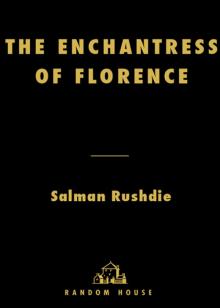 The Enchantress of Florence
The Enchantress of Florence Imaginary Homelands: Essays and Criticism 1981-1991
Imaginary Homelands: Essays and Criticism 1981-1991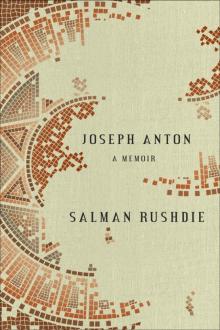 Joseph Anton: A Memoir
Joseph Anton: A Memoir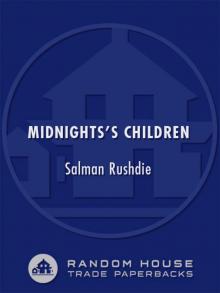 Midnight's Children
Midnight's Children East, West: Stories
East, West: Stories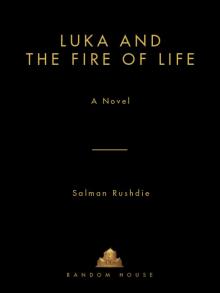 Luka and the Fire of Life
Luka and the Fire of Life Fury Fury Fury
Fury Fury Fury Haroun and the Sea of Stories
Haroun and the Sea of Stories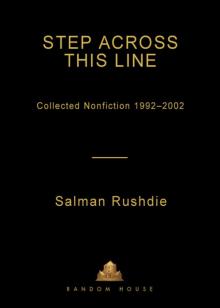 Step Across This Line: Collected Nonfiction 1992-2002
Step Across This Line: Collected Nonfiction 1992-2002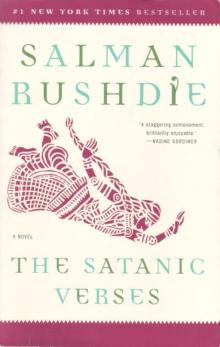 The Satanic Verses
The Satanic Verses The Moor's Last Sigh
The Moor's Last Sigh The Prophet's Hair
The Prophet's Hair The Ground Beneath Her Feet
The Ground Beneath Her Feet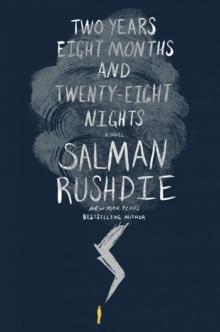 Two Years Eight Months and Twenty-Eight Nights
Two Years Eight Months and Twenty-Eight Nights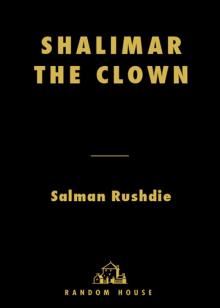 Shalimar the Clown
Shalimar the Clown Grimus
Grimus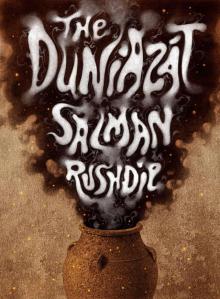 The Duniazát
The Duniazát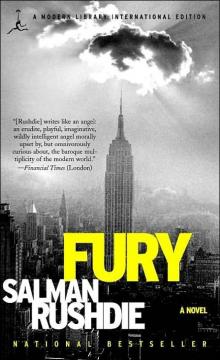 Fury
Fury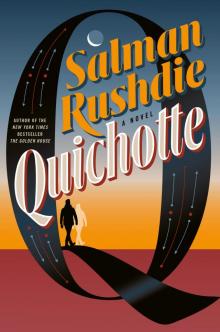 Quichotte
Quichotte The Jaguar Smile
The Jaguar Smile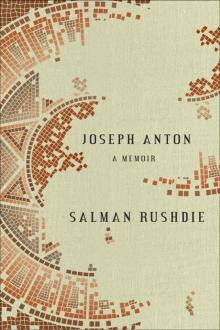 Joseph Anton
Joseph Anton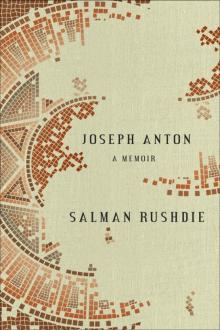 Joseph Anton: A Memoir: A Memoir
Joseph Anton: A Memoir: A Memoir Imaginary Homelands
Imaginary Homelands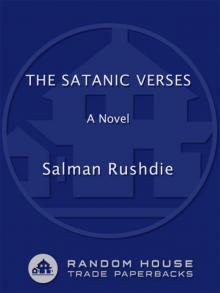 The Satanic Verses: A Novel
The Satanic Verses: A Novel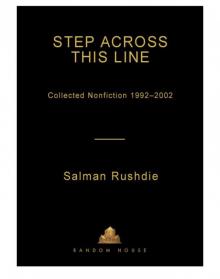 Step Across This Line
Step Across This Line East, West
East, West